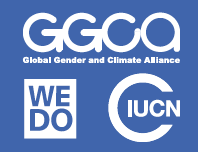The Women's Environment and Development Organization (WEDO) in partnership with the International Union for Conservation of Nature (IUCN), on behalf of the Global Gender and Climate Alliance (GGCA), have published a technical guide titled ‘United Nations Framework Convention on Climate Change (UNFCCC) Decisions and Conclusions: existing mandates and entry points for gender equality' for the 20th session of the Conference of the Parties (COP 20) to the UNFCCC to take place in Lima, Peru from 1-12 December 2014.
 20 October 2014: The Women’s Environment and Development Organization (WEDO) in partnership with the International Union for Conservation of Nature (IUCN), on behalf of the Global Gender and Climate Alliance (GGCA), have published a technical guide, titled ‘United Nations Framework Convention on Climate Change (UNFCCC) Decisions and Conclusions: Existing mandates and entry points for gender equality.’ The publication was prepared for the 20th session of the Conference of the Parties (COP 20) to the UNFCCC, which will take place in Lima, Peru, from 1-12 December 2014.
20 October 2014: The Women’s Environment and Development Organization (WEDO) in partnership with the International Union for Conservation of Nature (IUCN), on behalf of the Global Gender and Climate Alliance (GGCA), have published a technical guide, titled ‘United Nations Framework Convention on Climate Change (UNFCCC) Decisions and Conclusions: Existing mandates and entry points for gender equality.’ The publication was prepared for the 20th session of the Conference of the Parties (COP 20) to the UNFCCC, which will take place in Lima, Peru, from 1-12 December 2014.
The guide was developed to support: decision makers, negotiators and advocates in mapping current decisions that contain specific references to gender-related issues across all main areas of UNFCCC negotiations; and users in monitoring the implementation of gender-sensitive climate change policies and actions at all levels.
The guide provides a brief analysis of gender in UNFCCC decisions, and considers the gender balance in the current membership of the Adaptation Committee, Consultative Group of Experts (CGE), Standing Committee on Finance (CSF), Technology Executive Committee (TEC), Climate Technology Centre and Network (CTCN) Advisory Board and Green Climate Fund (GCF) Board.
The guide discusses how UNFCCC decisions address gender, with: 53% of decisions using a gender-sensitive approach; 25% using a gender-sensitive approach as well as focusing on gender balance; 16% addressing gender balance or women’s participation; 3% considering women as a “vulnerable group”; and 3% using a gender-sensitive approach as well as considering women as a “vulnerable group.” The guide also provides the number of decisions addressing gender under the main negotiating themes: 10 under adaptation; three under mitigation; five under finance; four under technology transfer; and five under capacity building.
The guide contains information on gender balance and women’s participation across the following UNFCCC negotiating areas: shared vision; adaptation; mitigation; finance; technology transfer; capacity building; loss and damage; and agriculture. [Publication: United Nations Framework Convention on Climate Change (UNFCCC) Decisions and Conclusions: Existing Mandates and Entry Points for Gender Equality]